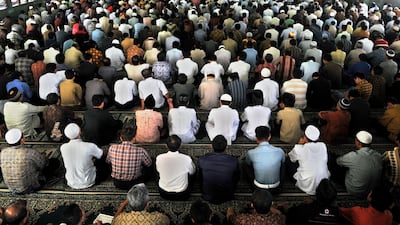On Sunday, Saudi authorities arrested an unspecified number of religious figures in a move that may very well signal a policy turn. While no reasons were publicly given as to why they were arrested, the authorities announced two separate operations on the same day. One case involved an ISIL plot, while the other, presumably related to the arrests of the clerics, involved individuals with "foreign intelligence" links. At least three notable clerics were apprehended, although unconfirmed reports suggest the number could be as high as 20.
The arrests, made by the recently established state security directorate, appear to be sending a message to vocal clerics that their time is up. It is a signal that authorities may be drawing new lines and changing their rules of engagement when it comes to dealing with certain types of Islamist-leaning figures.
__________________
Read more
Shaming the dead: Saudis forced to defend relatives killed in Istanbul nightclub attack
UAE says Iran is aiming for Arab 'chaos'
Al Sadr visit underscores the emerging Saudi foreign policy doctrine
__________________
As pro-government Saudis see it, those figures have learned how to tiptoe over red lines to express adversarial religious and political positions without the risk of punishment. Authorities want to put an end to the situation.
Both supporters and critics of the three clerics have apparently received the supposed message. For example, Abdul Latif Al ASheikh, the former chief of the Saudi religious police, commented on Twitter that the time was now ripe for a clampdown; Saad Al Faqih, a Saudi dissident in London, said the "margin of freedom" previously enjoyed by these religious figures was now closed.
Who are these figures? The clerics – who include Salman Al Odah, Awad Al Qarni and Ali Al Omari, as well as other unconfirmed individuals – are associated with a religious current that dates back to the 1970s, when a broad process of hybridisation between revolutionary Islamist ideas and Salafi teachings led to the birth of a new breed of clerics who portray themselves as reformists. Although products of the trend varied, they tended to be revolutionary. Many of the figures influenced by the trend went on to become jihadis or to directly influence jihadis, while others continued to adhere to peaceful activism.
Some of the most hardline clerics, violent and non-violent, were jailed in the early 2000s in Saudi Arabia for jihadi links. Others, peaceful but politically vocal, continued to enjoy a level of freedom to voice their views. In the wake of the Arab uprisings in 2011, they became social media stars with followers in the millions. They occasionally mobilised supporters against domestic and foreign policies, issuing fatwas and opinions on geopolitics and conflicts in the region.
A clampdown on these clerics was expected and will likely develop into a systematic effort to reverse their influence. Indeed, the role of such clerics is at the heart of the continuing diplomatic and political dispute with Qatar. Saudi Arabia and its allies accuse Qatar of supporting religious and political elements within their societies. When Riyadh took the unprecedented measures against Doha, it expected such figures to fall in line. It made it clear that criticism of the measures against Qatar was a red line, punishable by imprisonment. While most clerics expressed unequivocal support for their country's grievance with Qatar, these clerics remained silent.
__________________
More on Qatar in Opinion
Qatar has trampled on bonds of kinship
It's time to scrutinise linguistic nuances to combat manipulation
Too many false flags flutter over Qatar
__________________
The polarisation in the Qatar row plays against individuals with pro-Islamist sympathies. In addition, pressure on these clerics and activists came at a time when their credibility was already waning inside and outside the country. Their fatwas permitting jihad in several Arab countries, hate speech and other toxic views led to a pushback in recent years. Their one-time dominance online started to become increasingly challenged by young voices fed up by civil wars, sectarianism and "untouchable" celebrity clerics.
As the Qatar crisis erupted in June, Gulf officials privately indicated that a major focus for the countries opposed to Qatari policies would be activist clerics such as the ones arrested over the weekend.
Demand for compliance and solidarity with one’s country had more to do with ensuring uniformity rather than to undermine Qatar.
Even as the diplomatic stalemate with Qatar persists, the four countries see progress on the home front to be a key gain in and of itself.
At the end of the day, their anti-Qatar campaign is primarily a housekeeping effort to shield their countries from what they perceive to be a destabilising ideology with nerve centres in Qatar.
Regardless of how Saudi authorities deal with the arrested clerics, the move almost certainly marks a significant policy change. This new policy will likely continue in different forms to force clerics with previously unfettered religious and political views to fall in line.
Six years ago, these clerics could issue fatwas with no regard for consequences. Saudis repeatedly blamed them online and in mainstream media for youth moving to Syria and joining jihadi groups, but the clerics found themselves under no pressure to change their discourse. Evidently, this seems to be changing.
Hassan Hassan is a senior fellow at the Tahrir Institute for Middle East Policy
Follow The National's Opinion section on Twitter

